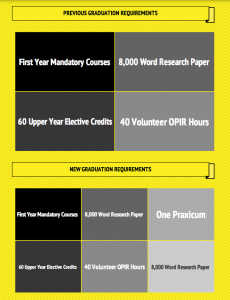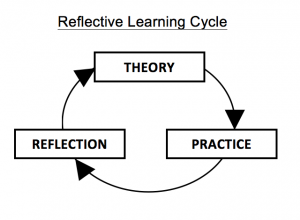MAXIMILIAN PATERSON
<Arts & Culture Editor>
As hopefully all the 1Ls are aware, at the beginning of this scholastic year, new graduation requirements were put into place by the top brass at Osgoode. These requirements called for every prospective graduate [beginning with the class of ‘15] to fulfill two 8,000-word research papers and participate in “at least one experiential learning class, clinical program or intensive,” now deemed a ‘praxicum.’
What is a ‘Praxicum’?
First of all, it’s important to point out that praxicum is actually a made up word. After doing a mini etymology investigation, it was found that the word praxicum finds its roots in the word “praxis” [definition: a practice, as distinguished from theory], and the word “cum” [definition: to describe things with a dual nature or function]. In the context of our legal education the word praxicum is used to describe experiential learning classes and clinics that integrate legal theory with practice, thus allowing students to participate in a cycle of reflective learning [see diagram below].
In an internal memo, school administration outlined that their decision to use such an original word was to distinguish the opportunities available at Osgoode from other ‘practicum’ opportunities available elsewhere. The difference is that a practicum is a placement “following (or preceding) the completion of a stand-alone program of study (but not necessarily directly connected to or integrated into that program of study),” whereas a praxicum incorporates “the need to apply learned theory, [and] requires that students actively engage with and reflect on their experiences…allowing students to integrate theory and practice in an active, ongoing and reflective way.”
How did this change come about?
Lets start with some numbers. Currently, over 60% of Osgoode graduates take advantage of praxicums [intensive programs, clinics, etc.]. Yet, the numbers show that due to enrolment constraints there are much more students applying to these programs than there are placed within them. Thus, the conclusion by Osgoode faculty members was to increase the focus on “clinical-type teaching…[and] expand the size and scope of [the] existing clinical/intensive offerings.”
By creating mandatory enrolment in at least one of these praxicums [this is how ‘praxicum’ is pluralized in the memo, however it would be cooler if it were ‘praxica’ or ‘praxici’] this is another way to separate Osgoode from other Canadian JD programs. After taking a brief look at other schools’ curriculums it is pretty safe to conclude that no other Canadian law school has such a broad and specialized set of experiential learning courses as we do. If anything, the traditional model of incorporating this type of learning to legal education was to rely on extra curricular clubs and clinics to make available these types of opportunities. However, by bringing experiential learning out of the ‘optional’ category and into the ‘mandatory’ category, opportunities that were not possible through student-run organization are now blossoming with the might of faculty resources behind them.
Why is this important?
Probably the most important question to ask when considering the necessity of this new graduation requirement is, ‘will this praxicum increase my chances of finding a job?’ Without putting much thought to it, this author is going to answer that question by saying, “the addition of the mandatory praxicum definitely isn’t going to hurt you.”
In other words, with the competitive job/articling market that currently exists in Ontario having some sort of ‘real world’ practical experience is possibly the necessary leg up needed to secure a position. Any experience that goes beyond the books and gets students to apply knowledge and theories practically [so long as it isn’t photocopying or midafternoon Starbucks runs] is a step towards becoming a more qualified and competent employee for the jobs/articles that don’t exist [see the LSUC 2011 Placement Report].
What praxicums are available?
Following this article are a series of opinion pieces outlining various students’ experiences in these practical programs, intensives and clinics. As well, there is also a list of approved praxicum classes that are available for students who have not yet fulfilled their requirement. This list however is not exhaustive, so talk to Student Services as further classes may be approved in the future.


